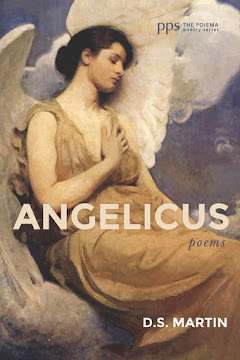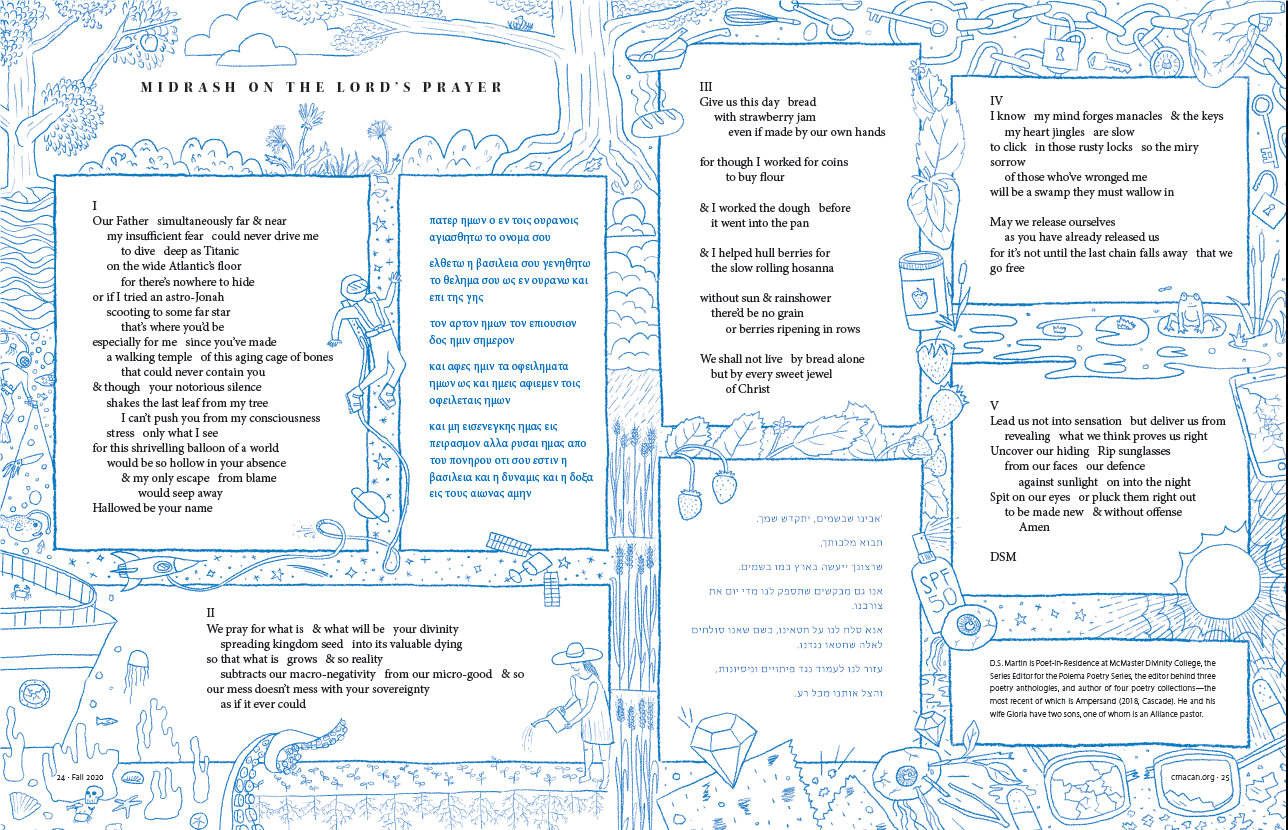Francis Thompson (1859—1907) was uninspired as a medical student, and neglected his studies. During an illness he became addicted to opium, and started living on the streets of London. At this time he applied to Oxford University, but was turned down due to his addiction. His fortunes began to turn for the better, however, when his first poems appeared in the periodical Merrie England. That’s when Robert Browning took notice of them. At the Premonstratensian Monastery in Storrington, Sussex, he was able to become free of opium.
In 1893 his book Poems was highly praised by Coventry Patmore in the Fortnightly Review. Much of Thompson’s best work relates to his Christian faith, particularly his best known poem, “The Hound of Heaven.”
To A Snowflake
What heart could have thought you? —
Past our devisal
(O filigree petal!)
Fashioned so purely,
Fragilely, surely,
From what Paradisal
Imagineless metal,
Too costly for cost?
Who hammered you, wrought you,
From argentine vapor? —
"God was my shaper.
Passing surmisal,
He hammered, He wrought me,
From curled silver vapor,
To lust of His mind —
Thou could'st not have thought me!
So purely, so palely,
Tinily, surely,
Mightily, frailly,
Insculped and embossed,
With His hammer of wind,
And His graver of frost."
*This is the second Kingdom Poets post about Francis Thompson: first post
Entry written by D.S. Martin. His latest poetry collection is Ampersand (2018, Cascade). His books are available through Amazon, and Wipf & Stock, including the anthologies The Turning Aside, and Adam, Eve, & the Riders of the Apocalypse.
Monday, November 26, 2018
Monday, November 19, 2018
Kathleen Norris*
Kathleen Norris is the author of several New York Times bestselling memoirs, including: The Cloister Walk, Acedia & Me, and Dakota: A Spiritual Geography. She is also the author of seven poetry collections, including: Journey: New and Selected Poems.
Norris explained in a recent interview why she writes across different Christian traditions:
-----“...when I first encountered the Benedictine monks, I was on
-----a religious search...I wasn’t sure if I was even a Christian...
-----It’s one of God’s gifts to me that I found this tradition of
-----communal prayer — the Psalm readings, you know, and monastic
-----spirituality. A lot of what I’m talking about is included in
-----Benedictine material, but it comes from a time when there
-----weren’t any divisions in the church. There was no Roman Catholic
-----Church versus Eastern Orthodox versus Protestant. It all stems
-----from the original taproot of the religions, so it’s really
-----accessible to anyone, and that’s how I’ve always felt as a
-----Protestant. The monastic tradition is mine, too.”
Her husband, the poet David Dwyer, died in 2003. She now divides her time between South Dakota and Hawaii, where she was raised. She is the nonfiction editor for Saint Katherine Review. In 2017 she served as chaplain for Image journal’s Glen workshop in Santa Fe, New Mexico.
Answered Prayer
I came to your door
with soup and bread.
I didn’t know you
but you were a neighbor
in pain: and a little soup and bread,
I reasoned, never hurt anyone.
I shouldn’t reason.
I appeared the day
your divorce was final:
a woman, flushed with cooking
and talk, and you watched,
fascinated,
coiled like a spring.
You seemed so brave and lonely
I wanted to comfort you like a child.
I couldn’t of course.
You wanted to ask me too far in.
It was then I knew
it had to be like prayer.
We can’t ask
for what we know we want:
we have to ask to be led
someplace we never dreamed of going,
a place we don’t want to be.
We’ll find ourselves there
one morning,
opened like leaves,
and it will be all right.
*This is the second Kingdom Poets post about Kathleen Norris: first post
Entry written by D.S. Martin. His latest poetry collection is Ampersand (2018, Cascade). His books are available through Amazon, and Wipf & Stock, including the anthologies The Turning Aside, and Adam, Eve, & the Riders of the Apocalypse.
Norris explained in a recent interview why she writes across different Christian traditions:
-----“...when I first encountered the Benedictine monks, I was on
-----a religious search...I wasn’t sure if I was even a Christian...
-----It’s one of God’s gifts to me that I found this tradition of
-----communal prayer — the Psalm readings, you know, and monastic
-----spirituality. A lot of what I’m talking about is included in
-----Benedictine material, but it comes from a time when there
-----weren’t any divisions in the church. There was no Roman Catholic
-----Church versus Eastern Orthodox versus Protestant. It all stems
-----from the original taproot of the religions, so it’s really
-----accessible to anyone, and that’s how I’ve always felt as a
-----Protestant. The monastic tradition is mine, too.”
Her husband, the poet David Dwyer, died in 2003. She now divides her time between South Dakota and Hawaii, where she was raised. She is the nonfiction editor for Saint Katherine Review. In 2017 she served as chaplain for Image journal’s Glen workshop in Santa Fe, New Mexico.
Answered Prayer
I came to your door
with soup and bread.
I didn’t know you
but you were a neighbor
in pain: and a little soup and bread,
I reasoned, never hurt anyone.
I shouldn’t reason.
I appeared the day
your divorce was final:
a woman, flushed with cooking
and talk, and you watched,
fascinated,
coiled like a spring.
You seemed so brave and lonely
I wanted to comfort you like a child.
I couldn’t of course.
You wanted to ask me too far in.
It was then I knew
it had to be like prayer.
We can’t ask
for what we know we want:
we have to ask to be led
someplace we never dreamed of going,
a place we don’t want to be.
We’ll find ourselves there
one morning,
opened like leaves,
and it will be all right.
*This is the second Kingdom Poets post about Kathleen Norris: first post
Entry written by D.S. Martin. His latest poetry collection is Ampersand (2018, Cascade). His books are available through Amazon, and Wipf & Stock, including the anthologies The Turning Aside, and Adam, Eve, & the Riders of the Apocalypse.
Monday, November 12, 2018
Daniel Klawitter
Daniel Klawitter lives in Denver, Colorado, where he is an ordained deacon in the United Methodist Church. He has published several poetry collections — most recently Quiet Insurrections (2018, White Violet Press).
His light touch, and delight in rhyme, makes his verse quite accessible. He has said, “…[A]ll my poems are driven primarily by an obsession with musicality and rhythm. It’s the cadence of a line of writing that haunts me first in my head and usually leads to a full-fledged poem.” His children’s poetry chapbook Put On Your Silly Pants received an honourable mention in the 2017 Dragonfly Book Awards for Children’s Poetry.
His poem “The Misuse of Scripture” demonstrates the playfulness often present in his poetry. It has recently appeared in Poems For Ephesians, a new poetry web-journal edited by D.S. Martin on the McMaster Divinity College website.
The following poem is from his chapbook An Epistemology of Flesh.
A Mystery
It’s true that old age
has its own bouquet:
the remembered, fermented
wine of childhood
now uncorked,
left to breathe
in the dark cellar
of skin, bone and memory.
For some the past
is a mausoleum.
For others, a museum
full of curiosities.
Yet the greatest mystery
is not the history of Eden
but what lies ahead:
that second childhood
where we cross our hearts,
bow our heads
and hope to die
to live again.
The last trumpet
And the last laugh is yours:
New wine will be poured
In new wineskins.
Posted with permission of the poet.
Entry written by D.S. Martin. His latest poetry collection is Ampersand (2018, Cascade). His books are available through Amazon, and Wipf & Stock, including the anthologies The Turning Aside, and Adam, Eve, & the Riders of the Apocalypse.
His light touch, and delight in rhyme, makes his verse quite accessible. He has said, “…[A]ll my poems are driven primarily by an obsession with musicality and rhythm. It’s the cadence of a line of writing that haunts me first in my head and usually leads to a full-fledged poem.” His children’s poetry chapbook Put On Your Silly Pants received an honourable mention in the 2017 Dragonfly Book Awards for Children’s Poetry.
His poem “The Misuse of Scripture” demonstrates the playfulness often present in his poetry. It has recently appeared in Poems For Ephesians, a new poetry web-journal edited by D.S. Martin on the McMaster Divinity College website.
The following poem is from his chapbook An Epistemology of Flesh.
A Mystery
It’s true that old age
has its own bouquet:
the remembered, fermented
wine of childhood
now uncorked,
left to breathe
in the dark cellar
of skin, bone and memory.
For some the past
is a mausoleum.
For others, a museum
full of curiosities.
Yet the greatest mystery
is not the history of Eden
but what lies ahead:
that second childhood
where we cross our hearts,
bow our heads
and hope to die
to live again.
The last trumpet
And the last laugh is yours:
New wine will be poured
In new wineskins.
Posted with permission of the poet.
Entry written by D.S. Martin. His latest poetry collection is Ampersand (2018, Cascade). His books are available through Amazon, and Wipf & Stock, including the anthologies The Turning Aside, and Adam, Eve, & the Riders of the Apocalypse.
Monday, November 5, 2018
Guillaume de Salluste du Bartas
Guillaume de Salluste du Bartas (1544—1590) is a French Huguenot, who served in the court of Henri IV, from well before he came to the French throne.
Du Bartas’ divine poetry was appreciated across Europe during the sixteenth and seventeenth centuries. At the turn of that century he was still the most esteemed poet in France, although literary fashions changed later in the 1600s. Because of his Protestant views, his influence was felt much longer in England — where he had made a significant impression on Philip Sydney, Edmund Spenser, and John Milton. James VI of Scotland’s enthusiasm for du Bartas’ verse also spread the poet’s fame.
He also made an impact on the Metaphysical poets. C.S. Lewis wrote in English Literature in the 16th Century, “…no one can point to a moment at which poetry began to be Metaphysical nor to a poet who made it so; but of all poets perhaps Guillaume de Salluste du Bartas… comes nearest to that position.”
The following is from Joshua Sylvester's translation, which appeared in editions from 1608 to 1641, and is part of the first poem from The Divine Weeks (Part 1—Building The World)
from The First Day
No sooner said He, “Be there light,” but lo!
The formless lump to perfect form ‘gan grow,
And all illustred with light’s radiant shine,
Doffed mourning weeds and decked it passing fine.
All hail, pure lamp, bright, sacred and excelling;
Sorrow and care, darkness and dread repelling;
The world’s great taper, wicked men’s just terror,
Mother of truth, true beauty’s only mirror—
God’s eldest daughter! O, how thou art full
Of grace and goodness! O, how beautiful!
Since thy great Parent’s all-discerning eye
Doth judge thee so, and since His Majesty—
Thy glorious Maker—in His sacred lays
Can do no less than sing thy modest praise.
This post was suggested by my friend Burl Horniachek.
Entry written by D.S. Martin. His latest poetry collection is Ampersand (2018, Cascade). His books are available through Amazon, and Wipf & Stock, including the anthologies The Turning Aside, and Adam, Eve, & the Riders of the Apocalypse.
Du Bartas’ divine poetry was appreciated across Europe during the sixteenth and seventeenth centuries. At the turn of that century he was still the most esteemed poet in France, although literary fashions changed later in the 1600s. Because of his Protestant views, his influence was felt much longer in England — where he had made a significant impression on Philip Sydney, Edmund Spenser, and John Milton. James VI of Scotland’s enthusiasm for du Bartas’ verse also spread the poet’s fame.
He also made an impact on the Metaphysical poets. C.S. Lewis wrote in English Literature in the 16th Century, “…no one can point to a moment at which poetry began to be Metaphysical nor to a poet who made it so; but of all poets perhaps Guillaume de Salluste du Bartas… comes nearest to that position.”
The following is from Joshua Sylvester's translation, which appeared in editions from 1608 to 1641, and is part of the first poem from The Divine Weeks (Part 1—Building The World)
from The First Day
No sooner said He, “Be there light,” but lo!
The formless lump to perfect form ‘gan grow,
And all illustred with light’s radiant shine,
Doffed mourning weeds and decked it passing fine.
All hail, pure lamp, bright, sacred and excelling;
Sorrow and care, darkness and dread repelling;
The world’s great taper, wicked men’s just terror,
Mother of truth, true beauty’s only mirror—
God’s eldest daughter! O, how thou art full
Of grace and goodness! O, how beautiful!
Since thy great Parent’s all-discerning eye
Doth judge thee so, and since His Majesty—
Thy glorious Maker—in His sacred lays
Can do no less than sing thy modest praise.
This post was suggested by my friend Burl Horniachek.
Entry written by D.S. Martin. His latest poetry collection is Ampersand (2018, Cascade). His books are available through Amazon, and Wipf & Stock, including the anthologies The Turning Aside, and Adam, Eve, & the Riders of the Apocalypse.
Subscribe to:
Posts (Atom)






















